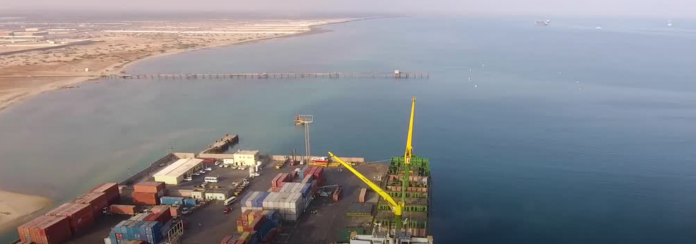BERBERA, Somaliland—The battle for hegemony in the Middle East is playing out at an ancient African port where traditional dhow fishing boats now share space with giant, container ships loaded around the clock by men in yellow high-visibility vests.
Berbera, in the breakaway republic of Somaliland, is perched on a narrow shipping lane leading to the Suez Canal and is just 260 nautical miles from Yemen’s civil war. Since antiquity, the town’s strategic shore has been coveted by military and maritime powers. Described by colonial-era travelers as the “key to the Red Sea,” the port became an Ottoman stronghold and later a British colonial outpost.
That explains why United Arab Emirates, Saudi Arabia’s strongest ally, pledged close to $450 million to take over the port here. Elsewhere along the Horn of Africa, allies Saudi Arabia and U.A.E. have snapped up ports and military bases at sites in Somalia, plus farther north in Djibouti and Eritrea. Qatar and Turkey, which support a different model of political Islam and are closer to Saudi Arabia’s arch-rival Iran, are building in Somalia and Sudan. China is positioned with a military base and a container port, for which it paid $700 million, in Djibouti and is exploring sites in Somalia. The U.S., meanwhile, conducts Africa operations and directs drones in the Persian Gulf from Camp Lemonnier in Djibouti, the largest U.S. base on the continent.
The scramble to lock down critical sites like Berbera is unscrolling all along the Horn and northward into the Red Sea. At stake is the precarious peace in one of the world’s most volatile and strategic corners, and the balance of power in the Middle East. The nearby Suez Canal, meanwhile, is the fastest and most heavily used shipping lane connecting Asia with Europe. It handles about 10% of the world’s seaborne trade, including roughly 10% of the world’s oil trade, according to the United Nations and the U.S. Energy Information Administration.
“We have new kids on the block…competition in the Middle East between the Sunnis and the Shias, and the Americans, the Russians, the Turks, the Qataris,” said Saad Ali Shire, Somaliland’s foreign minister. “It’s a poisonous meeting of interests coming together.”
Berbera and other sites along the northern coast of the Horn are important because of their proximity to Yemen, a stage for the rivalry between Iran and Saudi Arabia that is playing out across the Middle East. Saudi Arabia has been fighting a war there against Iran-backed Houthi rebels since 2015 with the support of allies like the U.A.E. Iran denies arming or training the Houthis.


The United Nations and independent investigators say Iran has used ports in Sudan and Somalia to smuggle weapons to Hezbollah and to allies in Yemen. In support of the other side in Yemen, a vast U.A.E. military base erected in isolated and secretive Eritrea in 2016 has been a launching pad for drones and jet strikes into the battle zone.
This Week on the Frontiers, June 2nd 2018
According to Unctad, more Africans migrate within Africa than to countries beyond the continent. In 2017 19 million international migrants moved within Africa, 17 million Africans left the continent and 5.5 million people came from outside the continent. As they move, they create connections that help both origin and destination economies and, Unctad asserts, help create “new trade and investment opportunities that can help both destination countries and origin countries to diversify their economies and move into productive activities of greater added value.”
Tensions have been rising in the Horn of Africa recently as global powers attempt to reinforce or establish footholds in the strategically important region, Matina Stevis-Gridneff reports. In a comprehensive and deeply researched feature, she explains the shifting rivalries and multi-billion-dollar bets that are bringing both wealth and anxiety to countries and territories such as Djibouti, Sudan, Somalia and Somaliland.
By Dan Keeler





































